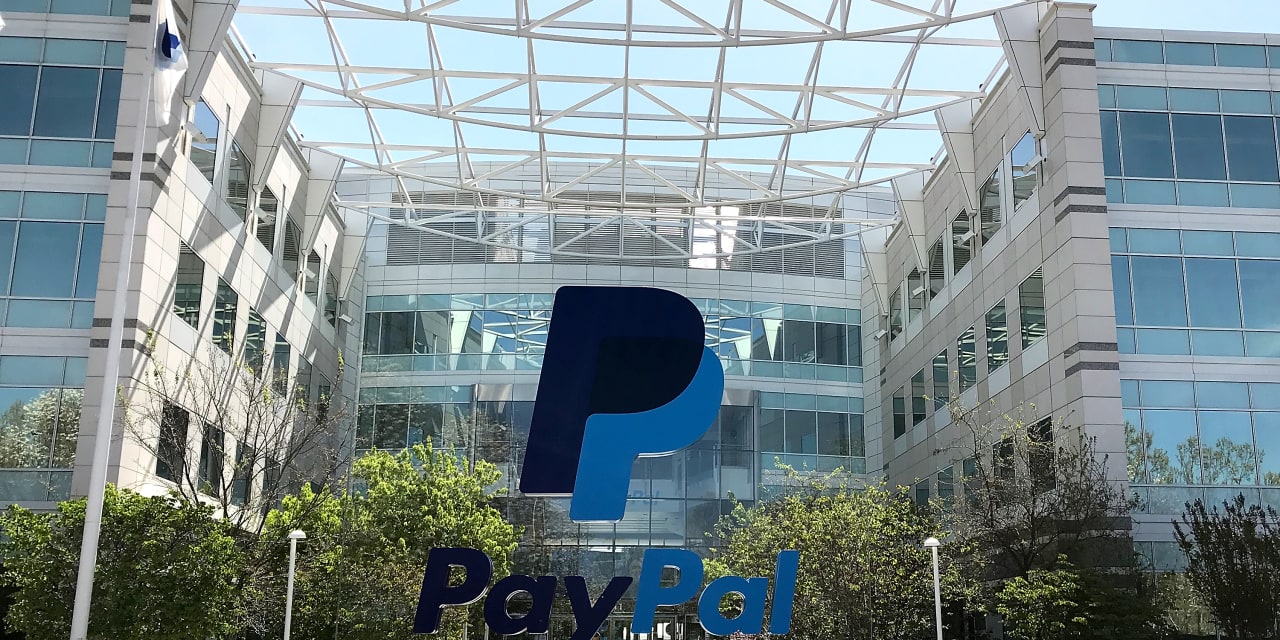It’s a time of upheaval for payment companies
PayPal
and Square—and an opportunity for patient investors.
Both PayPal (ticker: PYPL) and
Block
-owned Square (SQ) will have new chief executives in the coming weeks. While PayPal’s shift was part of a succession plan communicated to Wall Street earlier this year, Square’s transition was more sudden with plans announced via a regulatory filing after Monday’s close.
Despite the differing circumstances behind the leadership swaps, investors hope that changes at the top will boost the companies’ languishing stocks, which have fallen about 80% over the past two years.
Unlike what Tolstoy said about unhappy families, unhappy stocks are often alike. The onset of the pandemic led to a surge in e-commerce and contactless payments—areas where PayPal and Block operate—and aspirations well beyond their core competencies. At PayPal, there were plans for a “super-app,” offering payments, online shopping, savings, and other tools all in a closed ecosystem. Block also had “super-app” designs, encompassing payments and its “buy now, pay later” platform Afterpay (the company also owns music streamer Tidal, a
Spotify
(SPOT) competitor).
But when markets came back to earth in 2022, investors were less concerned about plans for global domination and more focused on profits and predictability. PayPal has since dialed down its dream of reaching 750 million users and other lofty ambitions, but still faces weaker growth in its higher-margin branded checkout business. Block’s most recent quarterly results suggest slowing growth in earnings before interest, taxes, depreciation, and amortization.
At PayPal, Alex Chris, a product-oriented executive from
Intuit
(INTU) will take the reins from outgoing chief executive Dan Schulman on Sept. 27 with Schulman planning to stay on the board until May 2024. Block founder and chief executive Jack Dorsey will take over the role of Square CEO when Alyssa Henry departs on October 2.
PayPal shares gained 2.8% on Aug 14 when Chriss was announced as CEO, while Block shares tumbled 2.2% on Sept 19, following news of Dorsey taking the role. But despite the mixed stock reaction, the consensus on The Street appears the same: change takes time.
Both PayPal and Block declined to comment.
On Block, Lisa Ellis, analyst at MoffettNathanson acknowledges that Henry’s exit is “a likely negative indicator” for the health of the Square business but she still remains optimistic about Block. She is also encouraged to see that the growth rate in gross merchandise volume in sellers with more than $500,000 in sales is 17%, nearly double that of merchants with less than $500,000 in sales.
Wall Street also found reasons to be excited about Dorsey’s renewed focus on Square after spending time on forays into cryptocurrencies and music.
“Dorsey has a rare zest of brilliance in building viral networks. Renewed focus on the point of sale business—and less time on Bitcoin—can be a big long-term positive,” says Mizuho Securities analyst Dan Dolev.
The new CEO is important for PayPal, but so is growing users. On that front, the company could get a boost from Temu,
Pinduoduo’s
(PDD) marketplace for Chinese goods, should help, says Dolev, who notes that PayPal use is 12 times higher on the site in August than it was one year ago. “[We] see potentially good news coming from China that could help reinvigorate Branded Checkout growth,” he explains.
Both stocks look tantalizingly cheap compared to historic averages. PayPal trades at 11.6 times earnings, down from its five-year average of 32 times while Block trades at 22.6 times earnings, well below its five-year average of 93 times, according to FactSet.
Cheap can mean value, or it can also be a warning, and investors can be forgiven for wanting to see signs of life in both before moving.
Just don’t wait too long—you might miss the payoff.
Read the full article here




